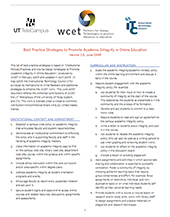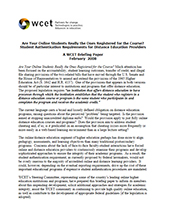Assessment & Academic Integrity
Assessment of student skills and knowledge in an online or digital learning environment can pose additional challenges. Artificial intelligence, especially generative text, has added to the challenge of ensuring academic integrity. Faculty and instructional designers strive to find the appropriate mix of assessments, including quizzes, tests, papers, projects, and other proof of mastery of the skills and knowledge taught in a specific course. Authentic assessments are increasingly important in recognizing learning in an era of artificial intelligence.
Additionally, in the world of education, there exist concerns about whether the student who registers for a course is the same one who participates in the assessment. This concern is one of the core issues of Academic Integrity.
“Academic Integrity can be thought of as “promoting the positive values of honesty, trust, fairness, respect, responsibility, and courage (International Center for Academic Integrity, 2013) as the intrinsically motivated drivers for ethical academic practice. Academic integrity is much more than “a student issue” and requires commitment from all stakeholders in the academic community, including undergraduate and postgraduate students, teachers, established researchers, senior managers, policymakers, support staff, and administrators” (Bretag, T., 2018).
Not only are efforts to curtail cheating on exams, plagiarism, submission of purchased essays written by others, and all forms of academic dishonesty poor academic practice, but they are a federal financial aid requirement.
WCET has led a number of important efforts to clarify, inform, and educate on promising practices for authentic assessment and academic integrity in digital learning environments.
WCET Resources
Related WCET Events
Tools and Strategies for Infusing Academic Integrity in a World of Artificial Intelligence
Hosted in partnership with Honorlock. This webcast provided insights on creating a culture of academic integrity in the fast-changing world of AI. As higher education leaders and administrators, you understand the importance of maintaining academic integrity. Panelists delved deep...
Technology-Enabled Alternative Assessment: What It Looks Like and How to Bring It to Your Institution
Hosted in partnership with the Advanced Learning Technologies Lab. As a follow up to the March 23 WCET webcast, Alternative Assessments in Digital Learning in Higher Education: Global Perspectives, WCET and University of Toronto’s Advanced Learning Technologies Lab brought back...
Alternative Assessments in Digital Learning in Higher Education: Global Perspectives
Hosted in partnership with OneHE. Remote learning highlighted some of the challenges associated with assessments via online learning. Proctoring, identity verification, and other means of authenticating the learner taking the test present challenges, including costs and privacy concerns. Alternatives...
The Cheating Economy and Integrity
WCET has had an active voice on academic integrity and cheating since 2008. In 2018, academic integrity was threatened by a notable increase in the commercialization of academic dishonesty to include contract cheating and the widespread online distribution by...

